3 july 2018
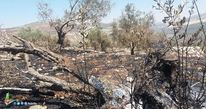
As the olive harvest season is approaching in Palestine, some Palestinian farmers like Mohamed Saqer Asida from Tell town in Nablus cannot collect their olive crops this year after extremist Jewish settlers set fire to vast tracts of land and destroyed their trees.
Farmer Asida and his family were anxiously waiting for the olive crop to ripen soon to harvest it before he paid a visit to his plot of land in the agricultural area of the town and was shocked to see all his trees damaged in a widespread fire deliberately caused by settlers, according to eyewitnesses.
The scene of torched olive trees and widespread land covered with soot and burnt grass in Tell town, especially in the area of Karam Shukir near the illegal settlement outpost of Havat Gilad, shows the enormity of the fire that spread over 70 dunums of land.
Local farmers say that about 300 olives trees have been destroyed in the fire.
Asida told the Palestinian Information Center (PIC) that almost a year ago, the olive harvest from his land alone produced 40 tin containers of oil (each container in Palestine holds from 8 to 15 liters according to its size), but following the fire, his land this year would yield only two or three containers of olive oil.
“The life has become black in front of my eyes after that crime, and the black color has become overwhelming. How can I make up for what happened?” he said as he was watching the area blackened and scorched by fire.
He affirmed that fellow farmers had seen settlers from the nearby outpost starting the fire before fleeing the scene quickly.
Similar arson attacks by settlers had taken place recently in agricultural areas in the West Bank towns of Madama and Asira al-Qibliya, which led to the burning of dozens of olive and almond trees.
Farmer Asida and his family were anxiously waiting for the olive crop to ripen soon to harvest it before he paid a visit to his plot of land in the agricultural area of the town and was shocked to see all his trees damaged in a widespread fire deliberately caused by settlers, according to eyewitnesses.
The scene of torched olive trees and widespread land covered with soot and burnt grass in Tell town, especially in the area of Karam Shukir near the illegal settlement outpost of Havat Gilad, shows the enormity of the fire that spread over 70 dunums of land.
Local farmers say that about 300 olives trees have been destroyed in the fire.
Asida told the Palestinian Information Center (PIC) that almost a year ago, the olive harvest from his land alone produced 40 tin containers of oil (each container in Palestine holds from 8 to 15 liters according to its size), but following the fire, his land this year would yield only two or three containers of olive oil.
“The life has become black in front of my eyes after that crime, and the black color has become overwhelming. How can I make up for what happened?” he said as he was watching the area blackened and scorched by fire.
He affirmed that fellow farmers had seen settlers from the nearby outpost starting the fire before fleeing the scene quickly.
Similar arson attacks by settlers had taken place recently in agricultural areas in the West Bank towns of Madama and Asira al-Qibliya, which led to the burning of dozens of olive and almond trees.
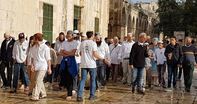
Israeli Prime Minister Benjamin Netanyahu on Tuesday permitted Knesset members to break-into al-Aqsa Mosque for the first time since two and a half years.
According to Israeli media sources, Netanyahu wrote to Knesset speaker Yuli Edelstein that MKs should be allowed up once every three months.
In October 2015, Netanyahu barred MKs from storming the holy shrine as part of an attempt to reduce tensions after the outbreak of Jerusalem Intifada.
Jewish extremist groups have repeatedly called for the Israeli government to exercise control over al-Aqsa Mosque compound. Their increased incursions into the mosque compound have triggered Palestinian protests across the occupied West Bank, including Jerusalem, and the Gaza Strip.
Although formally banned from praying there, Israeli activists enjoy police escort when they venture into the compound.
According to Israeli media sources, Netanyahu wrote to Knesset speaker Yuli Edelstein that MKs should be allowed up once every three months.
In October 2015, Netanyahu barred MKs from storming the holy shrine as part of an attempt to reduce tensions after the outbreak of Jerusalem Intifada.
Jewish extremist groups have repeatedly called for the Israeli government to exercise control over al-Aqsa Mosque compound. Their increased incursions into the mosque compound have triggered Palestinian protests across the occupied West Bank, including Jerusalem, and the Gaza Strip.
Although formally banned from praying there, Israeli activists enjoy police escort when they venture into the compound.
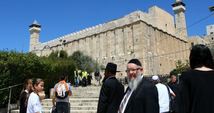
Israeli settlers on Tuesday morning carried out excavations in al-Yousufiy al-Tahta area located under the Ibrahimi Mosque in al-Khalil city.
Head of Awqaf Department in al-Khalil Ismail Abu al-Halawa told Quds Press that tunnels are being dug under the Ibrahimi Mosque with the participation of Israeli settlers under full protection by the Israeli occupation army.
Abu al-Halawa said that the Israeli occupation forces have stepped up their attacks on the Ibrahimi Mosque since the end of Ramadan with the aim of altering its Islamic character and turning it into a Jewish synagogue in a blatant violation of international laws.
The Israeli occupation authorities have recently opened a new detention center in the Old City of al-Khalil. During the month of Ramadan, the Israeli forces secured a settler break-in during which a copy of Torah was sneaked into the Ibrahimi Mosque.
The Israeli authorities imposed a temporal and spatial division on the holy site following the Ibrahim Mosque massacre in 1994 and usually prevent Palestinian worshipers from praying at the Mosque during Jewish holidays.
Head of Awqaf Department in al-Khalil Ismail Abu al-Halawa told Quds Press that tunnels are being dug under the Ibrahimi Mosque with the participation of Israeli settlers under full protection by the Israeli occupation army.
Abu al-Halawa said that the Israeli occupation forces have stepped up their attacks on the Ibrahimi Mosque since the end of Ramadan with the aim of altering its Islamic character and turning it into a Jewish synagogue in a blatant violation of international laws.
The Israeli occupation authorities have recently opened a new detention center in the Old City of al-Khalil. During the month of Ramadan, the Israeli forces secured a settler break-in during which a copy of Torah was sneaked into the Ibrahimi Mosque.
The Israeli authorities imposed a temporal and spatial division on the holy site following the Ibrahim Mosque massacre in 1994 and usually prevent Palestinian worshipers from praying at the Mosque during Jewish holidays.

A horde of extremist Jewish settlers on Tuesday morning attacked a car boarded by a Palestinian family in Wadi Sa’ir area, north east of al-Khalil in the occupied West Bank.
Yousef Kawazbeh, a resident of Sa’ir town in al-Khalil, told the Palestinian Information Center (PIC) that settlers from the settlement of Asfar hurled stones at his car, which was also boarded by his wife and children, as they were traveling in Wadi Sa’ir area, east of their native town.
He added that the assault caused panic among his family members and damage to his car.
In a separate incident, Jewish settlers from the outpost in the Old City of al-Khalil pitched on Monday night several tents in al-Shuhada Street, whose native residents had been forced to leave it over the past 20 years.
At the same time, dozens of settlers started to build a road for themselves connecting Tel Rumeida neighborhood with al-Shuhada Street as a prelude to seizing the remaining Palestinian property in the area and annexing it to their outposts of Beit Romano and Beit Hadassah.
Yousef Kawazbeh, a resident of Sa’ir town in al-Khalil, told the Palestinian Information Center (PIC) that settlers from the settlement of Asfar hurled stones at his car, which was also boarded by his wife and children, as they were traveling in Wadi Sa’ir area, east of their native town.
He added that the assault caused panic among his family members and damage to his car.
In a separate incident, Jewish settlers from the outpost in the Old City of al-Khalil pitched on Monday night several tents in al-Shuhada Street, whose native residents had been forced to leave it over the past 20 years.
At the same time, dozens of settlers started to build a road for themselves connecting Tel Rumeida neighborhood with al-Shuhada Street as a prelude to seizing the remaining Palestinian property in the area and annexing it to their outposts of Beit Romano and Beit Hadassah.
2 july 2018

The new settlement of “Amichai” has reportedly discharged sewage water, on Monday morning, that drenched Palestinian lands in a town called TurmusAyya, north-west of Ramallah.
Even though the residents tried to dig holes to collect the polluted water, it continued to flow toward adjacent lands. Locals fear that it would pose threat to their agricultural economy, especially for the owners of the land, since the situation has been ongoing for two months, intermittently.
The newly established settlement, under supervision of the “Maaleh Binyamin Regional Council” was built after the evacuation from “Amona” settlement, which currently has 40 families as dwellers, according to the PNN.
Despite objections from officials and local Palestinians, the new settlers confiscated the private Palestinian properties with protection from Israeli occupation forces.
Even though the residents tried to dig holes to collect the polluted water, it continued to flow toward adjacent lands. Locals fear that it would pose threat to their agricultural economy, especially for the owners of the land, since the situation has been ongoing for two months, intermittently.
The newly established settlement, under supervision of the “Maaleh Binyamin Regional Council” was built after the evacuation from “Amona” settlement, which currently has 40 families as dwellers, according to the PNN.
Despite objections from officials and local Palestinians, the new settlers confiscated the private Palestinian properties with protection from Israeli occupation forces.
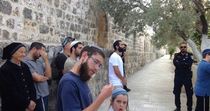
51 Jewish settlers on Monday morning stormed the plazas of al-Aqsa Mosque in Occupied Jerusalem from the Magharebah gate under Israeli police protection.
Jerusalem Endowment Department Media official told Quds Press that Israeli police protected groups of settlers who broke into the courtyards of the Muslims’ holy shrine in the morning hours.
Al-Aqsa Mosque witnesses, on a daily basis, the storming of Israeli settlers who perform Talmudic rituals and desecrate the sanctity of the holy Islamic site.
Israel seeks through such provocations to promote the temporal and spatial division of the Mosque and to systematically Judaize Jerusalem.
Jerusalem Endowment Department Media official told Quds Press that Israeli police protected groups of settlers who broke into the courtyards of the Muslims’ holy shrine in the morning hours.
Al-Aqsa Mosque witnesses, on a daily basis, the storming of Israeli settlers who perform Talmudic rituals and desecrate the sanctity of the holy Islamic site.
Israel seeks through such provocations to promote the temporal and spatial division of the Mosque and to systematically Judaize Jerusalem.
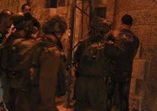
Israeli soldiers abducted, late on Sunday at night, the wife a Palestinian man who was killed by the army several years ago, in addition to three children, from their homes in the southern West Bank city of Hebron.
The soldiers invaded and searched many homes, and abducted Donya Sa’id, the wife of Nashat al-Karmi, who was killed by the army in October 2010.
Furthermore, the soldiers abducted three children, identified as Mohammad Abdul-Ghani Qfeisha, 10, Yousef Abed Rajabi, 12, and Mustafa Tareq Natsha, 11, from their homes in the city.
The children were taken prisoner after a group of extremist illegal Israeli colonists attacked two homes owned by members of Qfeisha family.
Media sources in Hebron said the three children were held for several hours, and were interrogated without legal representation, before they were released.
The soldiers also invaded the home of Mo’tasem Natsha, the brother of Ma’moun Natsha, who was killed by the army in October 2012, and violently searched it.
The soldiers invaded and searched many homes, and abducted Donya Sa’id, the wife of Nashat al-Karmi, who was killed by the army in October 2010.
Furthermore, the soldiers abducted three children, identified as Mohammad Abdul-Ghani Qfeisha, 10, Yousef Abed Rajabi, 12, and Mustafa Tareq Natsha, 11, from their homes in the city.
The children were taken prisoner after a group of extremist illegal Israeli colonists attacked two homes owned by members of Qfeisha family.
Media sources in Hebron said the three children were held for several hours, and were interrogated without legal representation, before they were released.
The soldiers also invaded the home of Mo’tasem Natsha, the brother of Ma’moun Natsha, who was killed by the army in October 2012, and violently searched it.
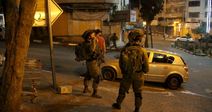
Two Palestinian citizens were injured Sunday evening after being assaulted by Israeli settlers on al-Shuhadaa street in the southern West Bank city of al-Khalil.
According to the PIC reporter, dozens of Israeli settlers attacked Hamza al-Bayed, 23, who had his leg broken, and Mufid al-Sharbati, 60, who fainted and fell to the ground after being brutally beaten.
The injured Palestinians were later transferred to the hospital for treatment by the Palestinian Red Crescent crews.
Israeli settlers have recently stepped up their attacks on Palestinian citizens in Tal Rumeida neighborhood and the Old City in al-Khalil in an attempt to force them to leave the area.
According to the PIC reporter, dozens of Israeli settlers attacked Hamza al-Bayed, 23, who had his leg broken, and Mufid al-Sharbati, 60, who fainted and fell to the ground after being brutally beaten.
The injured Palestinians were later transferred to the hospital for treatment by the Palestinian Red Crescent crews.
Israeli settlers have recently stepped up their attacks on Palestinian citizens in Tal Rumeida neighborhood and the Old City in al-Khalil in an attempt to force them to leave the area.
1 july 2018
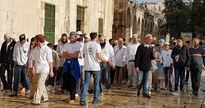
Dozens of Israeli settlers stormed on Sunday morning Jerusalem’s al-Aqsa Mosque—the third holiest site in Islam—via the Maghareba Gate.
A horde of 133 Israeli settlers, escorted by policemen, broke into al-Aqsa Mosque as part of the morning break-in shift and carried out a round of sacrilegious tours.
At the same time, the peaceful Muslim worshipers have been subjected to tough crackdowns and restrictions by the Israeli police near the main entrances to the site. Several worshipers have been searched and dozens more have had their IDs seized while attempting to enter al-Aqsa to perform their daily prayers.
A horde of 133 Israeli settlers, escorted by policemen, broke into al-Aqsa Mosque as part of the morning break-in shift and carried out a round of sacrilegious tours.
At the same time, the peaceful Muslim worshipers have been subjected to tough crackdowns and restrictions by the Israeli police near the main entrances to the site. Several worshipers have been searched and dozens more have had their IDs seized while attempting to enter al-Aqsa to perform their daily prayers.
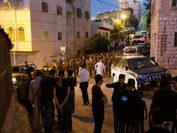
After groups of extremist illegal Israeli colonizers attacked homes and residents in the center of Hebron city, in the southern part of the occupied West Bank, Israeli soldiers turned the area into a closed military zone to the Palestinians, literally imprisoning them in their homes.
The Israeli measure came after groups of fanatic colonists gathered in Tel Romedia neighborhood, and the Shuhada Street, in the heart of Hebron city, and organized protests calling for removing every Palestinian from the area.
The fanatics came from several illegal colonies in Hebron, and other parts of occupied Palestine, while the soldiers started imposing further restrictions not on the assailants, but on the Palestinian natives of the occupied city.
The attacks witnessed a serious escalation over the last two days with more extremists arriving in the city to participate in these violations.
On Friday evening, a group of extremist colonizers attacked Palestinians in Tal Romeida neighborhood, while Israeli soldiers stood and watched, before attacking the Palestinians, and abducted one of them.
The Israeli measure came after groups of fanatic colonists gathered in Tel Romedia neighborhood, and the Shuhada Street, in the heart of Hebron city, and organized protests calling for removing every Palestinian from the area.
The fanatics came from several illegal colonies in Hebron, and other parts of occupied Palestine, while the soldiers started imposing further restrictions not on the assailants, but on the Palestinian natives of the occupied city.
The attacks witnessed a serious escalation over the last two days with more extremists arriving in the city to participate in these violations.
On Friday evening, a group of extremist colonizers attacked Palestinians in Tal Romeida neighborhood, while Israeli soldiers stood and watched, before attacking the Palestinians, and abducted one of them.
30 june 2018
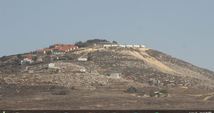
A former employee of Israel's Civil Administration declared a plot of land in the occupied West Bank to be state land and then, after leaving his job, set up an illegal outpost on it, Haaretz reported on Saturday.
The settlement outpost, located in Gush Etzion bloc and named Tzurei Ye'elim, now contains a farm and a guesthouse owned by the Israeli official Yossi Levitt and his partner, the Hebrew newspaper said.
Tzurei Ye'elim, which covers an area of 250 dunums, was built entirely without permits. A demolition order was issued against the buildings but has never been carried out.
According to Haaretz, the Civil Administration declared the site state land on 24th November 2013, and the outpost was illegally established in 2014. Aerial photographs show that Levitt began building the outpost immediately after he resigned from the Civil Administration.
The settlement outpost, located in Gush Etzion bloc and named Tzurei Ye'elim, now contains a farm and a guesthouse owned by the Israeli official Yossi Levitt and his partner, the Hebrew newspaper said.
Tzurei Ye'elim, which covers an area of 250 dunums, was built entirely without permits. A demolition order was issued against the buildings but has never been carried out.
According to Haaretz, the Civil Administration declared the site state land on 24th November 2013, and the outpost was illegally established in 2014. Aerial photographs show that Levitt began building the outpost immediately after he resigned from the Civil Administration.
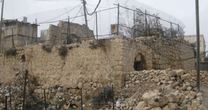
A group of extremist Israeli settlers late Friday attacked Palestinian residents in the Tel Rumeida area in the southern occupied West Bank city of al-Khalil.
The PIC reporter affirmed that settlers from Beit Hadassah, Beit Romano and Tel Rumeida settlements violently attacked Palestinian homes in the area.
Violent clashes broke out following the attack, where a number of locals, including minors, were injured.
The locals appealed to the Palestinian liaison office and international forces to intervene for their protection, but they received no answer.
The PIC reporter affirmed that settlers from Beit Hadassah, Beit Romano and Tel Rumeida settlements violently attacked Palestinian homes in the area.
Violent clashes broke out following the attack, where a number of locals, including minors, were injured.
The locals appealed to the Palestinian liaison office and international forces to intervene for their protection, but they received no answer.
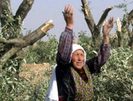
Several illegal Israeli colonizers invaded, Friday, Palestinian agricultural lands in Ein al-Qassis area in the al-Khader town, south of Bethlehem, and cut more than 20 trees and grapevines, in addition to destroying walls.
Ahmad Salah, the coordinator of the Popular Committee against the Annexation Wall and Colonies in al-Khader, said the attackers came from Sidi Boaz illegal colony, which was built on privately-owned Palestinian lands.
He added that the colonizers cut the trees and grapevines, in addition to stealing three rolls of barbed-wire fences.
The invaded lands, owned by Ahmad Rezeq Issa, as well as other lands owned by many Palestinians in the area, are subject to constant violations, carried out by illegal colonizers, and the army.
The farmers remain determined to remain on their lands, their only source of livelihood, despite the constant attacks, and the ongoing attempts to illegally annex them for the expansion of illegal colonies, built in direct violation of International Law.
Ahmad Salah, the coordinator of the Popular Committee against the Annexation Wall and Colonies in al-Khader, said the attackers came from Sidi Boaz illegal colony, which was built on privately-owned Palestinian lands.
He added that the colonizers cut the trees and grapevines, in addition to stealing three rolls of barbed-wire fences.
The invaded lands, owned by Ahmad Rezeq Issa, as well as other lands owned by many Palestinians in the area, are subject to constant violations, carried out by illegal colonizers, and the army.
The farmers remain determined to remain on their lands, their only source of livelihood, despite the constant attacks, and the ongoing attempts to illegally annex them for the expansion of illegal colonies, built in direct violation of International Law.

